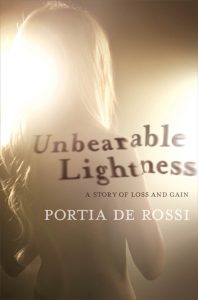 Atria Books (2010), $26, 308 pp.
Atria Books (2010), $26, 308 pp.
There’s a fine line between “want” and “need.” When you were a kid, you didn’t need another cookie, or that creamy glass with holiday garnish. And definitely, you didn’t need the calories. But oh, you wanted them.
So imagine denying yourself those and almost all other foods. Imagine living on 300 calories a day. Then read Unbearable Lightness, Portia de Rossi’s remarkable memoir.
Amanda Rogers was a smart kid who aspired to become a lawyer in her native Australia, until the modeling bug bit her and she quickly decided that the runway was the way to run. She convinced her mother to drive her to an interview, and she convinced executives that, at age 12, she could handle the world of high fashion. Though she felt uncomfortable and self-conscious about perceived body flaws, she persevered, changing her name to Portia de Rossi.
Later, when given the chance to be in a movie, de Rossi was surprised that she loved acting, though she wasn’t confident about her beauty. She thought her face was too round, her cheeks too fat, her thighs too chubby. Her weight yo-yoed. Wardrobe tailors on the Ally McBeal set were kept busy with alterations. De Rossi was mortified.
But that wasn’t her only source of personal loathing. She had always known that she was gay, but it wasn’t discussed. She married, but the union ended when he learned the truth at couple’s therapy. Co-workers weren’t told because de Rossi feared for her job. She denied her feelings and lived in terror of being outed.
Embarking on a nutritionist-recommended low-calorie diet didn’t quell the diet demon in de Rossi’s mind, so she went on a program all her own.
She meticulously weighed each ounce of food, fretted over “hidden calories,” and obsessively avoided anything that might add to her daily intake.
On the day she hit 82 pounds, she said that celebration was in order but, “first I had to silence the drill sergeant that reminded me of that extra inch of fat. First I had to get rid of that.”
As with many memoirs like Unbearable Lightness, I had two very dissimilar feelings while reading it. First, this book reeks with pain. De Rossi is very clear about the bruising thoughts and negativity that she felt in hiding so many personal aspects of her life, and though this book has a make-you-grin, wonderfully happy ending, getting there hurts.
Second, it hurts to read not just because of the pain de Rossi relays, but because it can be slow. In the end, de Rossi’s pantry held a paltry handful of items, for instance, and that fact was hammered home in many ways, many times.
Still, if you’ve ever lived too long with a secret that ate you alive, read this. You won’t just want Unbearable Lightness, you need it.
— Terri Schlichenmeyer
This article appeared in the Dallas Voice print edition March 18, 2011.















